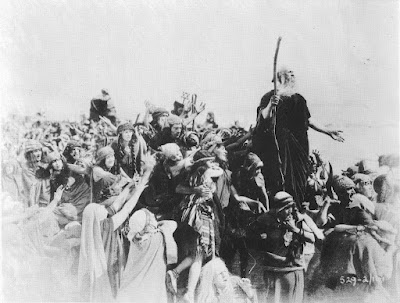Thou shalt not miss it!
On Wednesday, Sept. 20, I'll accompany the original silent version of 'The Ten Commandments' (1923) at the Leavitt Theatre, 259 Main St., Ogunquit.
Showtime is 6 p.m. Lots more info in the press release below.
Abbreviated post due to prep for the upcoming 'Early Fall Four-State 'Captain of Her Soul' book-signing with author Lara Gabrielle, which runs from Sept. 21-24.
Stay tuned. And see you in Ogunquit for 'The Ten Commandments' on Wednesday evening. More info below!
* * *
MONDAY, SEPT. 11, 2023 / FOR IMMEDIATE RELEASE
Contact Jeff Rapsis • (603) 236-9237 • jeffrapsis@gmail.com
Original 'Ten Commandments' movie to screen at Leavitt Theatre
Silent film Biblical blockbuster to be shown on 100th anniversary with live music on Wednesday, Sept. 20
OGUNQUIT,
Maine—Decades before he directed Charlton Heston as Moses, filmmaker
Cecil B. DeMille's original silent version of 'The Ten Commandments'
(1923) wowed audiences the world over during the early years of cinema.
DeMille's
pioneering Biblical blockbuster will be screened on Wednesday, Sept. 20
at 6 p.m. at the historic Leavitt Theatre, 259 Main St., Route 1 in
Ogunquit.
Admission is $12 per person. Doors open at 5 p.m.; the
Leavitt's full dinner menu and bar service will be available during the
program.
The screening, the latest in the Leavitt's silent film
series, will feature live accompaniment by Jeff Rapsis, a New
Hampshire-based composer who specializes in creating music for silent
films.
DeMille's original 'Ten Commandments' was among the first
Hollywood films to tackle stories from scripture on a grand scale. The
picture was a popular hit in its original release, and served as a
blueprint for DeMille's later remake in 1956.
Despite the silent
original's epic scale, the Moses story takes up only about the first
third of the film. After that, the tale changes to a modern-day
melodrama about living by the lessons of the Commandments.
In
the McTavish family, two brothers make opposite decisions: one, John, to
follow his mother's teaching of the Ten Commandments and become a poor
carpenter, and the other, Danny, to break every one of them and rise to
the top. The film shows his unchecked immorality to be momentarily
gainful, but ultimately disastrous.
A contrast is made between
the carpenter brother and his mother. The mother reads the story of
Moses and emphasizes strict obedience and fear of God. The carpenter,
however, reads from the New Testament story of Jesus' healing of lepers.
His emphasis is on a loving and forgiving God. The film also shows the
mother's strict lawful morality to be flawed in comparison to her son's
version.
The other brother becomes a corrupt contractor who
builds a church with shoddy concrete, pocketing the money saved and
becoming very rich. One day, his mother comes to visit him at his work
site, but the walls are becoming unstable due to the shaking of heavy
trucks on nearby roads. One of the walls collapses, with tragic results.
This sends the brother on a downward spiral as he attempts to right his
wrongs and clear his conscience.
Throughout the film, the visual
motif of the tablets of the Commandments appears in the sets, with a
particular Commandment appearing on them when it is relevant to the
story.
'The Ten Commandments' boasts an all-star cast of 1920s
performers, including Theodore Roberts as Moses; Charles de Rochefort as
Rameses; Estelle Taylor as Miriam, the Sister of Moses; Edythe Chapman
as Mrs. Martha McTavish; Richard Dix as John McTavish, her son; Rod La
Rocque as Dan McTavish, her other son; and Leatrice Joy as Mary Leigh.
The
Exodus scenes were filmed at Nipomo Dunes, near Pismo Beach, Calif., in
San Luis Obispo County, which is now an archaeological site. The film
location was originally chosen because its immense sand dunes provided a
superficial resemblance to the Egyptian desert.
After the
filming was complete, the massive sets—which included four 35-foot-tall
Pharaoh statues, 21 sphinxes, and gates reaching a height of 110 feet,
which were built by an army of 1,600 workers — were dynamited and buried
in the sand.
However, the burial location at Nipomo Dunes is exposed to
relentless northwesterly gales year-round, and much of what was buried
is now exposed to the elements, as the covering sand has been blown
away.
The visual effect of keeping the walls of water apart while
Moses and the Israelites walked through the Red Sea was accomplished
with a slab of gelatin that was sliced in two and filmed close up as it
jiggled. This shot was then combined with live-action footage of actors
walking into the distance, creating a vivid illusion.
Live music
is a key element of each silent film screening, said Jeff Rapsis,
accompanist for the Leavitt Theatre's silent film screenings. Silent
movies were not shown in silence, but were accompanied by live music
made right in each theater. Most films were not released with official
scores, so it was up to local musicians to provide the soundtrack, which
could vary greatly from theater to theater.
"Because there's no
set soundtrack for most silent films, musicians are free to create new
music as they see fit, even today," Rapsis said. "In bringing a film to
life, I try to create original 'movie score' music that sounds like what
you might expect in a theater today, which helps bridge the gap between
today's audiences and silent films that are in some cases more than 100
years old."
‘The Ten Commandments’ (1923) will be shown with
live music by Jeff Rapsis on Wednesday, Sept. 20 at the historic Leavitt
Theatre, 259 Main St., Route 1 in Ogunquit.
Admission is $12 per
person. Doors open at 5 p.m.; the Leavitt's full dinner menu and bar
service will be available during the program.
For more info, call (207) 646-3123 or visit www.leavittheatre.com.




No comments:
Post a Comment